Are you a Quiet Speculation member?
If not, now is a perfect time to join up! Our powerful tools, breaking-news analysis, and exclusive Discord channel will make sure you stay up to date and ahead of the curve.
Playing on the Pro Tour, and doing well, was an incredible experience for me. I went 10-6 at PT Battle for Zendikar, a good enough finish to cash. I've been thinking a lot about the lessons I learned during my preparation for and play during the PT, and today I'm going to do something different and share some of these. While the specifics I gathered really only apply to Standard and the Pro Tour, this is Modern Nexus, and there were a number of general lessons that apply to every format and have helped me to improve my game. I hope they will help you too.
![ftl209_training_ground[1]](https://quietspeculation.com/wp-content/uploads/2015/11/ftl209_training_ground1.jpg)
Analyzing and emulating the behaviors of incredibly skilled players is one of the best tools anyone can use in becoming better. While professional players periodically stream and many release videos weekly for various websites, looking at how they approach tournaments, games, and deck building can benefit players of any skill level. I am writing this article from the perspective of someone who has put in the effort and looked at all of these concepts to try and improve. It certainly has helped me reach a higher level of play skill. That said, this article acts as both a learning exercise to those for whom this is a new concept, and as a reminder to the grizzled veterans that taking time to look over what the best players in the world consistently do is important. I am also taking from my recent experience of flying to bigger tournaments and working to take that next step from grinder to member of the Pro Players Club.
[wp_ad_camp_1]
Pick Your Battles
The best piece of advice I ever received about playing Magic at a higher level is to skip events that you do not feel fully prepared for.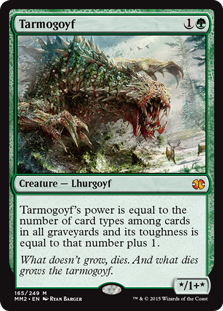 Events are grueling and often come down to knowing every aspect of your deck or the format at large. In a 15 round event, being able to operate at high levels on autopilot because you have a full understanding of the format is something that will spread the pressures of the event out and allow for intense moments of focus when you need them. The ability to autopilot without major mistakes comes from extensive preparation and repetitions with the deck you are playing and against various major matchups you expect to face. For example, if you have been preparing for a Modern Grand Prix by putting in hundreds of reps with Abzan, you are much more likely to do well with Abzan than any other deck you could audible to right before the tournament. Consequently, consider a Standard Grand Prix just after the Modern event. Given how much preparation it took to do well in the Modern tournament, skipping the Standard GP might yield a similar result to actually playing in it, while also helping fight burn-out from too many events.
Events are grueling and often come down to knowing every aspect of your deck or the format at large. In a 15 round event, being able to operate at high levels on autopilot because you have a full understanding of the format is something that will spread the pressures of the event out and allow for intense moments of focus when you need them. The ability to autopilot without major mistakes comes from extensive preparation and repetitions with the deck you are playing and against various major matchups you expect to face. For example, if you have been preparing for a Modern Grand Prix by putting in hundreds of reps with Abzan, you are much more likely to do well with Abzan than any other deck you could audible to right before the tournament. Consequently, consider a Standard Grand Prix just after the Modern event. Given how much preparation it took to do well in the Modern tournament, skipping the Standard GP might yield a similar result to actually playing in it, while also helping fight burn-out from too many events.
That is not to say if you feel prepared in both formats you should skip one. Rather, if you dedicate everything to one event, the next weekend you should look for an event in that format, or consider not playing in a major event. This comes up often with format specialists, or with players looking to qualify for the RPTQ during Standard season but then want to play a Modern Grand Prix. Deciding which event should take your focus and where you should use your finite resources is a very important aspect to doing well at bigger events and goes against the more traditional grind-until-you-make-it mentality that is difficult to maintain.
Knowledge is Power
In a similar vein to skipping events where you do not feel fully prepared, for any format you plan to play a big event in, you should know the general game plan for all tier 1, tier 1.5, and most tier 2 decks that have put up recent results. First, this allows you to know how to counteract their game plan and better understand what cards have value in the matchup. Second, this allows you to operate within the context of who is the aggressor in a matchup better. Understanding this concept is very important, fundamental even, especially in a format like Modern where it is not always straightforward. In the Splinter Twin versus Abzan matchup, the Abzan player is the aggressor until the Twin player’s turn three. Once the game hits Twin’s turn three, the Abzan player has to work with the board presence they developed and take the controlling route, maintaining mana and resources to interact with the potential combo at all times. As the game progresses, the Abzan player can start playing more things so long as it does not leave them vulnerable to an end step Pestermite or Deceiver Exarch.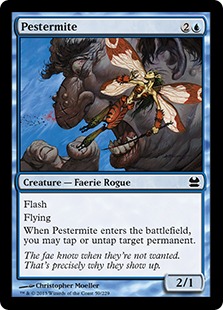 With anything less than a detailed understanding of the moments when your role changes in certain matchups, you are leaving yourself open to major mistakes that cost you games and matches you cannot afford to lose at bigger tournaments.
With anything less than a detailed understanding of the moments when your role changes in certain matchups, you are leaving yourself open to major mistakes that cost you games and matches you cannot afford to lose at bigger tournaments.
Once you have put in your hours with a deck and understand the format, set goals for the event. Start small and work towards the bigger goals you have for the tournament. This gives you smaller things to focus on while keeping your head in each match. Justin Desai, a very good New England player I was talking to at Grand Prix Quebec City, warned me of the dangers of looking at the big picture at events, as it tends to sap your focus from important decisions and games. If you lose focus for one match, it can be the difference between Top 8 and Top 32, the difference between Day 2 and side events on Sunday. Start with goals like winning your first match of a tournament or hit three wins, something smaller that keeps your focus on the first few rounds of an event. From there, once you meet those goals, try setting more step-by-step goals. For example, if you have one bye at a Grand Prix, make your first goal reaching 3-0. Once you reach 3-0, your new goal is to reach four wins, then five, then to qualify for Day 2 at seven wins. Keep making small goals and always make them positive! Win seven rounds and do not lose three matches mean the same thing for someone with no byes at a Grand Prix, but one is a positive to strive for and the other creates pressure and fosters negativity.
Leveling Up
Now, let us look at in-game things that can really help you reach the next level, ones that pro players consistently do. Take your time while playing. While there are limits to this statement, since draws at bigger events are essentially losses for most purposes, slowing down and considering your plays and even smaller decisions more closely can improve your game greatly. The best way to incorporate this into your arsenal, without also slowing down your overall pace of play, is to think ahead, evaluate your plans on your opponent’s turn, and adjust them based on their plays. With an understanding of the format, there are not many plays that should catch you completely off guard. With that in mind, it is easy to work through your plan and account for most of the plausible things your opponent could be trying to do. This also allows you to speed up parts of the game such as fetching. If you consider what your plan is, what you need to reach it, and how you are winning this game every turn, you can stay constantly focused on the game and close it out by cutting off the most avenues for your opponent to win.
Tighten Up
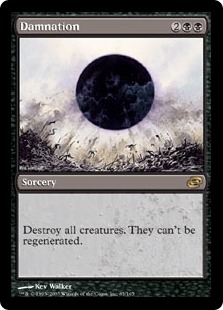 Another big tactic very good players often employ is tight play while ahead. It becomes very easy to loosen up and take your foot off the gas while it looks like you are very far ahead, but this is very dangerous. The easiest way to stay ahead and not allow your opponent to claw back from these situations is to constantly consider how you lose from your current position and how to stop that from happening. For example, if you have a Tarmogoyf and a Scavenging Ooze on board against no creatures from your Jund opponent post-sideboard, how do you lose? One way would be to play out more creatures and play into their potential Damnation. If you consider this option and hold excess creatures, if your opponent plays Damnation, you can deploy more threats and put them in a similar hole.
Another big tactic very good players often employ is tight play while ahead. It becomes very easy to loosen up and take your foot off the gas while it looks like you are very far ahead, but this is very dangerous. The easiest way to stay ahead and not allow your opponent to claw back from these situations is to constantly consider how you lose from your current position and how to stop that from happening. For example, if you have a Tarmogoyf and a Scavenging Ooze on board against no creatures from your Jund opponent post-sideboard, how do you lose? One way would be to play out more creatures and play into their potential Damnation. If you consider this option and hold excess creatures, if your opponent plays Damnation, you can deploy more threats and put them in a similar hole.
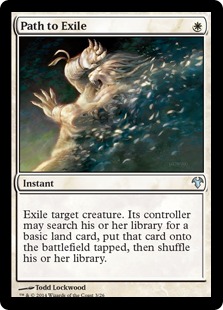 Focus in game is very important, but evaluating how you played after the game is almost more important. During a game, it is difficult to find misplays that are not egregious. Finding the smaller mistakes that slowly give back momentum and allow your opponent to make those comebacks everyone has experienced that start from cannot-possibly-lose and quickly become cannot-possibly-win increases your win percentage drastically. Evaluate decision trees from the game and look at the choices you made and how they affected the game. Using an Abrupt Decay on a Tarmogoyf when you also have Path to Exile can leave you vulnerable to a Liliana of the Veil follow-up. Path lines up poorly against the planeswalker, but Abrupt Decay is the answer you need. Small choices like this can spiral out of control and turn a very close game into a loss.
Focus in game is very important, but evaluating how you played after the game is almost more important. During a game, it is difficult to find misplays that are not egregious. Finding the smaller mistakes that slowly give back momentum and allow your opponent to make those comebacks everyone has experienced that start from cannot-possibly-lose and quickly become cannot-possibly-win increases your win percentage drastically. Evaluate decision trees from the game and look at the choices you made and how they affected the game. Using an Abrupt Decay on a Tarmogoyf when you also have Path to Exile can leave you vulnerable to a Liliana of the Veil follow-up. Path lines up poorly against the planeswalker, but Abrupt Decay is the answer you need. Small choices like this can spiral out of control and turn a very close game into a loss.
Just Ask
One of the best places to learn from these mistakes or find them is through talking to players that are better than you. I spent half a round talking to my friend and Legacy Champs Semi-Finalist Akash Naidu who helped me see that I had made two major mistakes in two different matches at Grand Prix Indianapolis this past weekend. I had not seen the line in the same way he had. By not seeing the disadvantage of my play, when I drew a card that was an out from his play but not mine, I made a decision that cost me the match. Discuss lines with other players. Understand that in most games where you lose, you made at least a few choices that contributed to that loss. These are major steps in improving and not making those same mistakes again.
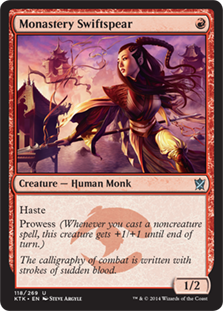 Another important concept worth remembering is that your opponent is not an idiot. If they are making a play that seems particularly odd, consider why they would make that choice. There are going to be times when your opponent plays poorly and does something suboptimal without realizing it, but there are times when they are playing in a way that gives you free information if you stop to think about it. If your attacks their Monastery Swiftspear into your 2/3 Tarmogoyf, consider that with Atarka's Command Swiftspear becomes a 3/4. Small considerations like this allow you to make decisions that are more informed. That said, sometimes walking into those obvious tricks is correct. Getting cards out of your opponent’s hand and preventing damage are sometimes worth letting your opponent "get you", in turn increasing your odds of winning the game.
Another important concept worth remembering is that your opponent is not an idiot. If they are making a play that seems particularly odd, consider why they would make that choice. There are going to be times when your opponent plays poorly and does something suboptimal without realizing it, but there are times when they are playing in a way that gives you free information if you stop to think about it. If your attacks their Monastery Swiftspear into your 2/3 Tarmogoyf, consider that with Atarka's Command Swiftspear becomes a 3/4. Small considerations like this allow you to make decisions that are more informed. That said, sometimes walking into those obvious tricks is correct. Getting cards out of your opponent’s hand and preventing damage are sometimes worth letting your opponent "get you", in turn increasing your odds of winning the game.
Similarly, never underestimate your opponent based on any factor. Age, sex, gender, and anything at all does not mean your opponent is any less skilled, and you certainly should not make that assumption. As we all saw from the story of Brandon Burton from the Pro Tour, anyone can come to a tournament and crush it. I have seen many players get frustrated from losing to someone younger, or to someone of the other sex or gender, and most the time, those losses stemmed from a disrespectful view of that player’s abilities. Understand that anyone who shows up to an event could be the best player in the room and treating them as anything less is setting yourself up to play worse or give up small edges. When you do that then suddenly, no matter how skilled they are, you have made yourself much worse.
Getting Better
In conclusion, there are many more ways beyond these tips to improve and make yourself a better player, but the biggest thing is to look for that improvement. We all hit points where we feel we have plateaued and we cannot improve, but that point never exists. The greatest players in the history of the game can still improve and so can anyone else willing to look for the places to improve and work at it with sincere effort. Put in the effort to prepare for every event you want to play in, learn the format for those events inside and out, set reasonable goals, look for places where you made mistakes within the game, and put more time into thinking during matches. Taking these few steps will put you that much further ahead of the rest of the room. If you keep looking for ways to get better, you will find your way and break through.




Enjoyable and informative read. Important for any even marginally competitive player — will take these tips to heart looking forward to a tournament tonight. One note, I think you dropped the word ‘opponent’ in par 2 under “Just Ask” — “If your [___] attacks their Monastery Swiftspear into your 2/3 Tarmogoyf, consider that with Atarka’s Command Swiftspear becomes a 3/4. Small considerations like this allow you to make decisions that are more informed.”
I would have rather had a simple article on how the Pro Tour went for this author, since he did well. Instead, this author, who just started playing competitively in 2012, of course wants to be in the “Pro Players Club” now, and is writing an advice article with his extreme lack of experience? Because he got lucky in one GP? I hear from new players, everyday, how they want to go pro. Well, anyways, good luck with that. From what I’ve seen, this website is mostly older players who have played for 10 years or more and have picked up this obvious ‘advice’ forever ago.
says the guy who’s been playing for 10 years and not been on the pro tour let alone cashed one.lol.